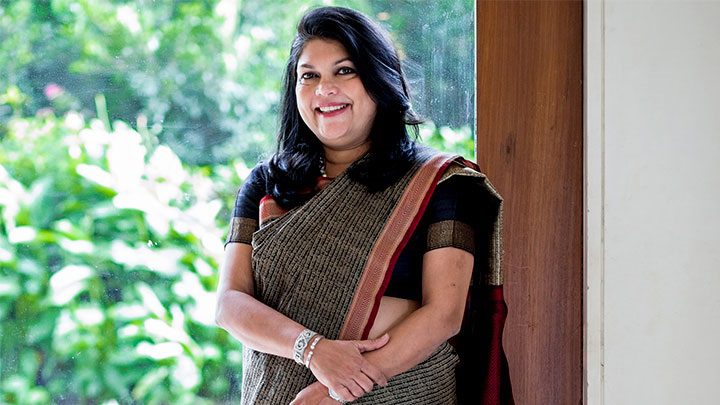(November 8, 2021) Did you know that only 10% of the world’s venture capital-backed unicorn startups are founded by women? In fact, only five out of India’s 136 unicorn startups are led by women. And 29-year-old Ankiti Bose, founder of fashion platform Zilingo, is set to join this exclusive club as her Singapore-based startup grows from strength to strength.
The six-year-old startup capitalises on Southeast Asia’s growing internet connectivity to bring small-time fashion vendors from street markets in Bangkok and Jakarta onto an e-commerce platform. It has also expanded into B2B offerings. Backed by marquee investors like Sequoia Capital and Temasek Holdings, Zilingo reached unicorn status with a valuation of a little over a billion dollars earlier this year and propelled this Indian-born entrepreneur into Fortune’s 40 Under 40 list, Forbes Asia 30 Under 30 list, and Bloomberg 50. This Global Indian is also one of the youngest Indian women to lead a unicorn startup.
"Choosing the right founding team for your #startup and early investors is a bigger, more serious decision than even marriage, and can be murkier than a divorce if you get it wrong. Always look for people who aren't afraid of the brutally honest truth ” @AnkitiB #forbes30under30 pic.twitter.com/s6jiKLDAbt
— Zilingo (@Zilingo) July 12, 2019
The CEO from India
Born and brought up in India, Ankiti graduated from St Xavier’s College Mumbai with a degree in Math and Economics. Her father worked in a state-owned oil company, which led to the family moving frequently when she was a child, while her mother was a university lecturer. Ankiti, then, worked with McKinsey on strategy and operations across various industries including India’s technology and telecom sector. She later joined venture capital firm Sequoia Capital as an analyst where she specialised in consumer internet and e-commerce opportunities on mobile platforms.
It was while she was at Sequoia, that Ankiti happened to visit Thailand’s Chatuchak Market, one of the largest bazaars in the world with over 15,000 stalls. It struck the analyst that these small-time fashion vendors had no avenue to sell their wares online. This led to the birth of Zilingo in 2015, which she co-founded with Dhruv Kapoor, an engineer that she’d met at a party. Ankiti was 23 at the time.

The fashion e-commerce platform soon became something of a legend for its rapid success and for putting Ankiti on the fast-track to becoming one of the most successful entrepreneurs in Asia. In an interview with The CEO Magazine, Ankiti said that part of the reason she switched to entrepreneurship was probably foolish courage. “It was a decision completely driven by passion and optimism. I saw the opportunity in Southeast Asia; the growth of the region looked like it could be phenomenal because it was super under-penetrated. But had I over analysed the situation, it would’ve been harder to make the decision,” she said.
Building from ground up
The switch was not without its share of challenges. Born and raised in India, Ankiti had quite a bit of re-learning and familiarising to do as she ventured into the Southeast Asian market with its new countries, cultures, foods, currencies, and languages. She had to give up the comfort and familiarity of home to set up shop in a somewhat alien country. Her young age too proved to be a road block at times with several stakeholders failing to take her seriously initially. “Seeing a 28-year-old talk to factory managers and workers isn’t the norm. Many wondered if I would even be able to run a business, but they quickly learnt otherwise,” she told YourStory.
Fortunately, the gamble paid off and today Zilingo is a unicorn that is backed by marquee investors. However, the company’s valuation is far from Ankiti’s mind. “Being a unicorn company was never the goal. It was never about just selling clothes to businesses and somehow working in fashion. Zilingo was created to make fashion more fair, transparent and sustainable. We think that we’re making a difference and making the world better. So, for us, that valuation doesn’t really mean anything unless we’re delivering really solid outcomes for our shareholders,” she said.

Zilingo is now touted to be one of the largest B2B e-commerce players in Southeast Asia and has offices in Indonesia, Hong Kong, Thailand, Philippines, Australia, India, New York and Los Angeles. In 2019, it also began working with factories in California to source fabric from Asia.
As Ankiti worked to expand Zilingo, she also launched its supply-chain tech operations. The decision stemmed from their interactions with sellers and realised the multiple issues involving logistics, supply and finance that were waiting to be addressed. Zilingo currently offers an end-to-end cloud platform which connects the manufacturer to the brand directly and also provides them a tech platform which offers analytics and financial services.

Digitising to success
One of the things that really worked in Zilingo’s favour is its move to digitise even small businesses. And it couldn’t have come at a better time; with the pandemic, the need to go online has been reinforced like never before. It’s thanks to Zilingo that several small and medium enterprises are able to tide over the ramifications of the pandemic and its global fall outs. The world has seen several small businesses shut shop thanks to the global lockdowns and economic slowdown. The push to go online has never been stronger and Ankiti says that this has certainly worked in their favour. “For us, it’s been phenomenal because most of the businesses that we would have otherwise had to convince to use our technology already know they need it. Now our entire pitch doesn’t even need to happen. Our business has actually grown in the sense that it has become more profitable over the last year,” she said.

Giving Back
Business growth and expansion has not been the only things on Ankiti’s mind. This entrepreneur also ensured that her company did its bit to help the country tide over the devastating first and second waves by shipping much-needed PPE kits to hospitals across India, Indonesia, and Singapore.
As a young Asian woman, she has also faced her share of bias. Even as Zilingo made it big, Ankiti found herself being mistaken for an assistant or a model for the products her platform sells. Instead of letting it get to her, she used it as fuel to drive her progress and pave the way forward for other women entrepreneurs.
She now ensures that Zilingo has a workforce that’s at least 50% female, with several of them in leadership roles. The Zilingo network also tried to do as much as it can to support women in the unorganised labour sector by mentoring them and providing women circles where they support each other.
Ankiti’s journey to the top has been nothing short of inspiring, but what lends her even more credence is her effort to give women along the way an equal footing in a world that doesn’t often offer them a level playing field.

